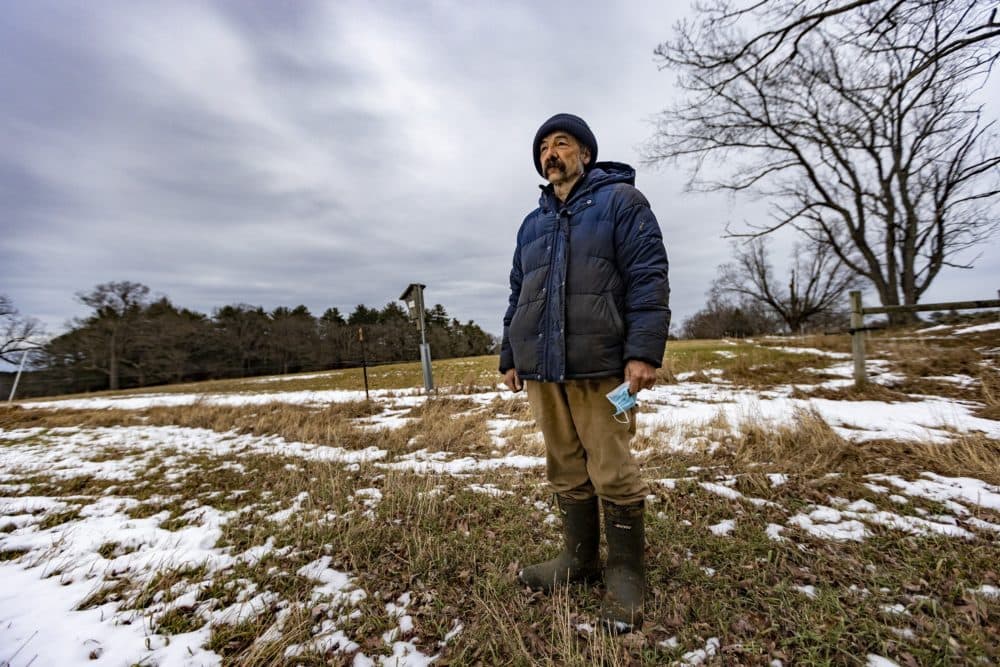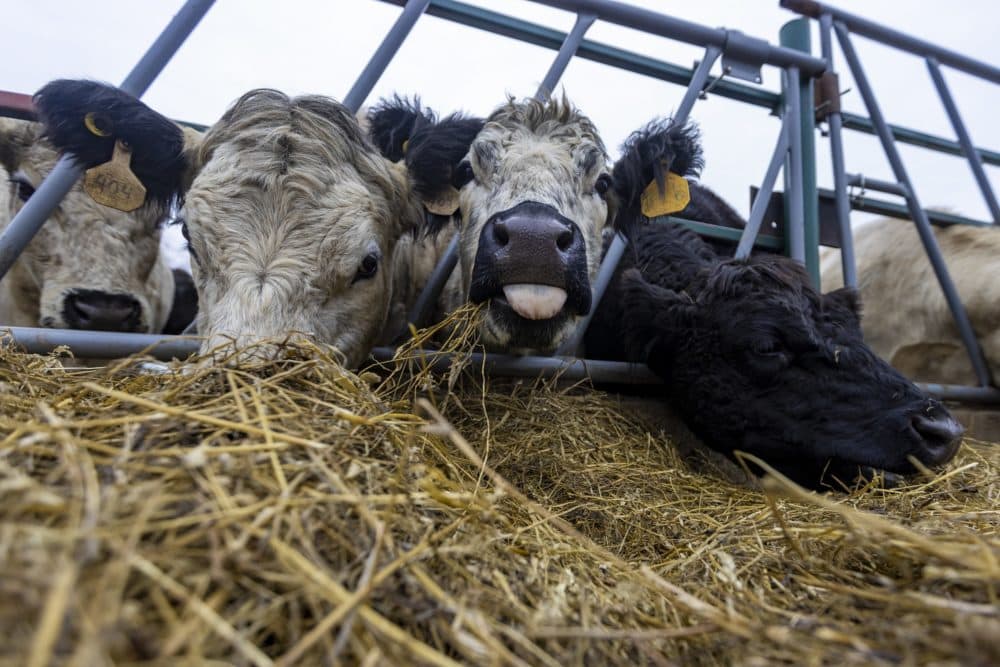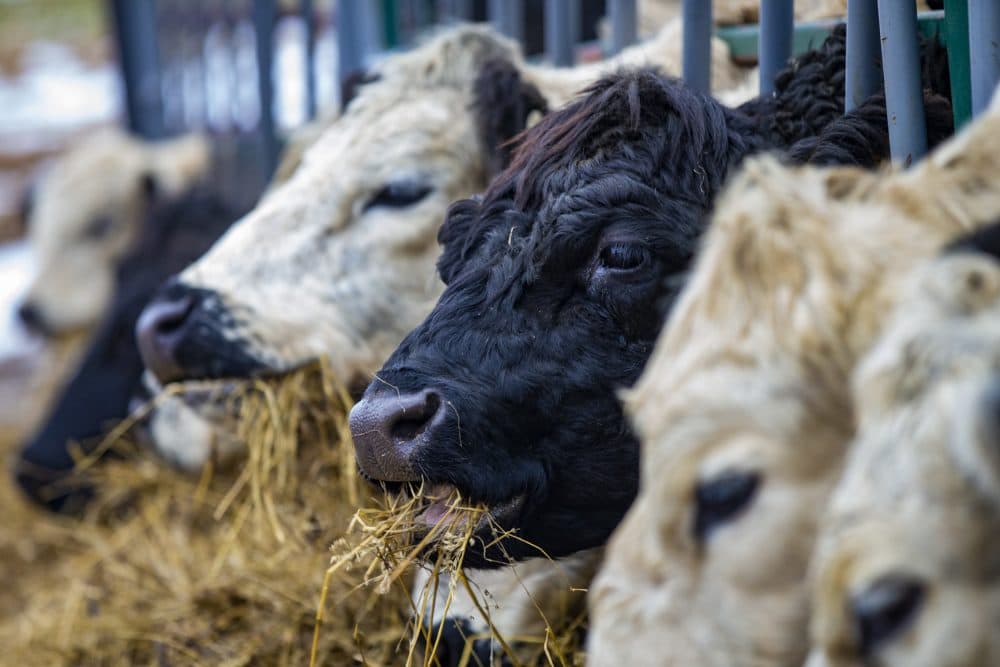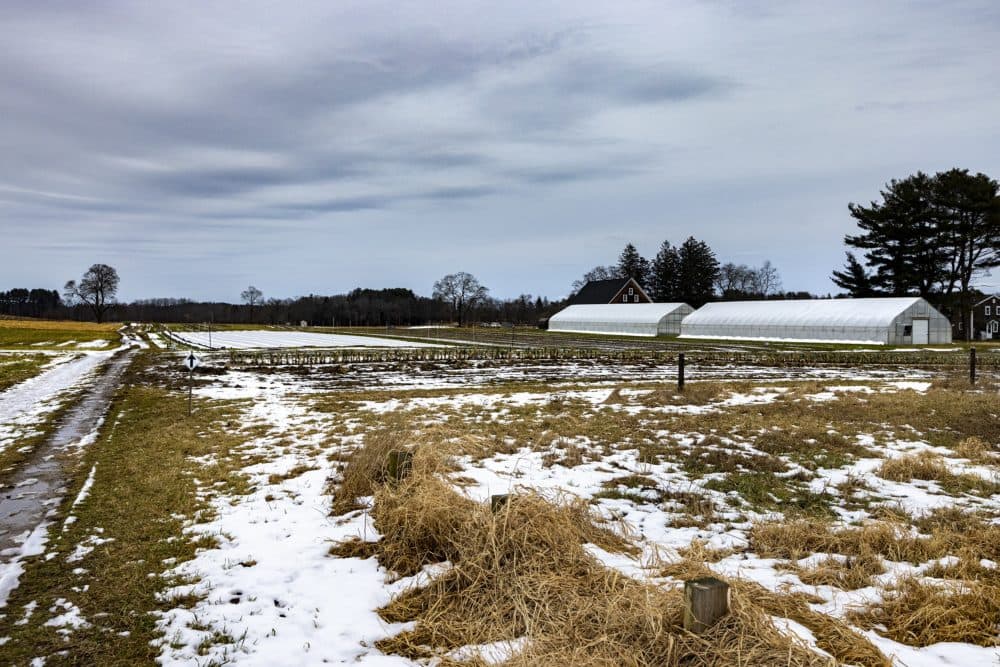Advertisement
'There is a price, and not just a dollar amount': A North Shore beef farmer on meat and climate change

Aaron Knight grew up on a New Hampshire farm, and has raised dairy and beef cattle his whole life. Growing up, he says, “fuel was cheap and prices were pretty good, and we used a lot of chemicals, and that was just the way you did it.”
That’s not the way he raises cattle anymore.
Until he left Appleton Farms this past April, Knight managed a herd of about 90 beef cattle on the Ipswich farm. Cattle at Appleton are raised on pasture, and eat only grass and hay their whole lives. The farm focuses on soil health, sustainable ecosystem management and humane animal handling.
WBUR met Knight in January to walk around the farm and talk about cows, climate change and sustainable farming for its newsletter "Cooked: the search for sustainable eats." The interview has been condensed and edited for clarity.
Can I start with a stupid question? So, the cows go out and eat the grass, and they fertilize the pasture as well? Can you explain this whole system?
We intensively graze everything here. I move the cows about every two to three days; they'll be set up in a paddock and they'll graze it down. So, they're cleaning it up for us, clipping it right down, eating the good stuff and the invasive [plants], depositing their manure and urine on pasture, and then we move them on. And by doing that, we get a good chance of regrowth.
OK, got it. So, lots of people say that we shouldn't be eating beef at all, even grass-fed, sustainably raised beef. What do you think about that?
I’ve got a lot of different feelings on that. I don't know if I want to be recorded on some of them! It's an expensive protein. I think, used in the right proportions, it's an efficient protein. And if it's harvested in a fashion that sustains the whole system, I think it's a good thing.
The way we do it here, we really try to follow those practices. We're trying to put back into the land, not be hard on the land and to raise a product that is responsible. It's not easy. No one is in it for the money, that's for sure. Out west, it's a different story. Beef is really cheap. They raise it in mass quantities and it's not fed very well.
I think it goes on to the consumer to think about that type of protein. How often do you need it? How often should you be eating it? If you're getting your meat from a feedlot out west, I don't think that's a good idea.

But grass-fed, sustainably-raised beef is more expensive than conventionally-raised beef. How do you respond to the argument that not everybody can afford it?
I eat meat. But my wife and I, we're smart about it. We get our protein in other ways; meat isn't our biggie. I think to live a right life, everything needs to be balanced, right?
You live on this beautiful farm and are really connected to your food, but that’s pretty different from the way most people eat. Do you ever go out to the supermarket to check out how people are interacting with their food?
I don't leave here very often. But one of the most fascinating places I go is the grocery store. I love seeing things in the grocery store, and I like to read product labels and see everything that's going on. I also like to watch the people and think about what they are doing.
Does it make you sad sometimes?
It could make me very melancholy, but I also think that maybe we're at a spot now where people just got to wake up. We’ve got to do something different. It isn't later — it's now; we’ve got to start doing things. It's everybody's part to talk about that and it all ties right into climate change. How are we living? How are we consuming?
We [farmers] play a part in it, and I think we are doing a good job here. I know how many cattle we can have on this farm to treat the land right, treat the animal right and make a good product for the right price. And that makes it a little more expensive. But if people are buying meat from us or veg, they're doing a good thing for the Earth because we're trying really hard to follow a sustainable path.
When most people eat, what do you think they're thinking about?
They're probably just hungry and want something that tastes good, right?
I think over time, though, as we see more things go on with climate change, food is an issue. Those two things are very connected, and I don't know how much people connect them. I think they look at cars and factories and coal emissions, but if you take all that and break it down, a large percentage of that is to produce our food or transport our food. So, I think the more that we can eat local, then we are doing our part, and then the farmer works harder to be right-sized and take good care of what he is doing on his farm. It all ties together.
Do you feel like you're an outlier among farmers or are more people coming around to your way of thinking?
There’s a large movement. There are a lot of younger people and they've seen what has gone on before, and they want to do something different. They want to farm in a way that supports that whole system.
In New England, it's gotten harder in the dairy industry. Milk prices just plummeted. There is a lot of this bust and boom, and people decided, 'Well, we've got to come up with a way where we can make farming more stable for us.' So, they started doing 'value-added' — making yogurt, figuring out how to make cheese. And by doing those things, they could be smaller. And if you can raise less cows and still make a living, you're doing better because you're putting less emissions into the air. So, I think a lot of them are just trying to be smarter about how they farm.
And I think it can be done. I think you can farm and take good care of the Earth and hopefully educate people on how to live smarter and choose wiser, you know? One of the reasons I really like dairy is it’s probably one of the best proteins you can eat. And from a farmer standpoint, generally I can get 15, 16 years out of a cow. And you think about all that protein that they're making, and then you put a dollar value to it, it's incredible.
Advertisement

What is it about farming that makes you want to keep doing it?
Well, you're outdoors. I love the animals. I’d get bored, I think, if I had to do one thing. You have to do animal care, animal husbandry, electrician, plumber, everything. And some days I’ll do all of that. And I like that.
I had a very funny thing happen this year. I had just put the cows out and there was a lot of calves — 37 calves. And so I moved them up into an upper section, and there was a straggling male coyote hanging around. I happened to look up on the hill, here are all of these calves chasing a coyote down over the hill! I was like, 'Oh my god, this is awesome.'
I get to see a lot of things that other people don't see, you know? I guess I'd rather be out here seeing these things.
Do you ever feel bad for the cows?
It’s very, very hard for me when I’ve got to choose for harvest. I really struggle. And then probably, oh, two weeks before I've got to choose, I choose. And then I don't feel right for a couple weeks after.
If I didn't have that feeling, maybe it would be time to not be doing this. Because you need that amount of caring to do a good job with them. I give them the absolute best life they can have until that time. I think we go above and beyond to make sure of their comfort and their welfare.
Dairy is a little different because, like I say, you get 15 years out of cattle and on my farm, a lot of my cows just died on the farm. I would prefer that, you know? It is hard, because I interact with them more than I do any people.
I think that goes back to thinking about the protein and how you're using it. It is a living being that is giving up its life for your sustenance. I don't want to steer anybody away from it. But there is a price to be paid for whatever you're consuming. There is a price, and not just a dollar amount.

